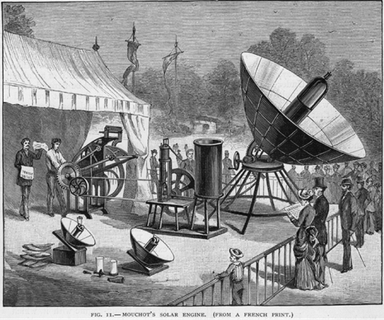At the heart of the 19th century, as the world witnessed the early signs of the industrial revolution, a French mathematician and inventor set out to harness the ancestral power of the sun. Augustin Mouchot, with his fearless vision and ingenuity, paved the way for modern solar energy technologies. By the 1860s, he was laying the groundwork for what would later become a crucial technology for our energy transition. By inventing devices such as a solar water heater and a curious cooker, Mouchot was already embarking on bold explorations that would enrich the repertoire of renewable energy solutions. The 1878 World’s Fair in Paris witnessed the genius of this man when his solar oven was displayed at the Algeria pavilion, marking a milestone in the history of sustainable energy.
In the distant lands of the 19th century, a visionary man stood against the headwinds and skeptics of the industrial world. This figure, Augustin Mouchot, was not just a mathematician from Tours; he was a dreamer, an architect of the future. In an era dominated by steam and coal, Mouchot saw an alternative light, that which the celestial bodies offered daily: the energy of the sun.
Mouchot, with unwavering determination, set out to tame this golden heat. Inventing unprecedented devices like the solar water heater for bathing and the solar oven, he laid the foundations of a new era. His creations, proudly unveiled at the 1878 World’s Fair, testified to a wisdom far beyond his time.
Although France did not immediately become a pioneer of this new energy source, the long shadow of Mouchot’s legacy is still perceptible today. The year 2025, marking the bicentennial of his birth, will serve as a powerful reminder of this man whose genius allowed us to envision a world where the rays of the sun could, one day, illuminate the future for all.

the journey of a pioneer
Augustin Mouchot, born in Semur-en-Auxois in 1825, is often considered one of the first true visionaries in the field of modern solar energy. The son of a humble stonecutter, Mouchot first trained in mathematics at the École Normale Supérieure. His teaching career allowed him to cultivate an insatiable curiosity for the sciences, leading to innovative explorations of the potential of solar energy conversion. As early as 1860, he began working on a prototype of a “solar cooker,” a clever invention designed to demonstrate the practical utility of solar energy. His experiments marked a decisive turning point in the use of renewable resources to energize modern life.
innovative inventions
In 1866, Mouchot took a new step with the creation of the solar engine, a breakthrough that would revolutionize how solar energy was perceived until then. This device operated using thermal energy captured by large parabolic reflectors, turning water into steam to power mechanical engines. Mouchot succeeded in demonstrating that this innovation could, beyond mere heat production, perform mechanical work, thus opening new perspectives for future technologies. This success led him to file several patents for his solar devices, including the spectacular solar oven, showcased at the 1878 World’s Fair, which proved the phenomenal power of concentrated solar energy.
the legacy and impact
Despite his spectacular advancements, Mouchot faced financial difficulties and a lack of general interest in his inventions during the later years of his life. Confronted with increasing competition from the coal industry, government financial support waned, hampered by short-term economic considerations. However, his impact is still felt today, as the world seeks to place solar energy at the center of discussions on future energy. Mouchot’s explorations and bold designs served as solid foundations for subsequent advances in the solar field, thereby contributing to the myriad of technologies that compose today’s sustainable energy.
Articles similaires
Thank you!
We will contact you soon.














